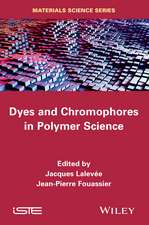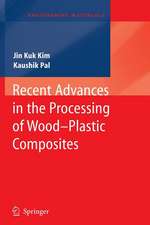Microreaction Technology: IMRET 5: Proceedings of the Fifth International Conference on Microreaction Technology
Editat de M. Matlosz, W. Ehrfeld, J.P. Baselten Limba Engleză Paperback – 22 oct 2012
Preț: 405.66 lei
Nou
Puncte Express: 608
Preț estimativ în valută:
77.62€ • 81.04$ • 64.24£
77.62€ • 81.04$ • 64.24£
Carte tipărită la comandă
Livrare economică 04-18 aprilie
Preluare comenzi: 021 569.72.76
Specificații
ISBN-13: 9783642627064
ISBN-10: 3642627064
Pagini: 600
Ilustrații: XV, 578 p.
Dimensiuni: 155 x 235 x 32 mm
Greutate: 0.83 kg
Ediția:Softcover reprint of the original 1st ed. 2001
Editura: Springer Berlin, Heidelberg
Colecția Springer
Locul publicării:Berlin, Heidelberg, Germany
ISBN-10: 3642627064
Pagini: 600
Ilustrații: XV, 578 p.
Dimensiuni: 155 x 235 x 32 mm
Greutate: 0.83 kg
Ediția:Softcover reprint of the original 1st ed. 2001
Editura: Springer Berlin, Heidelberg
Colecția Springer
Locul publicării:Berlin, Heidelberg, Germany
Public țintă
ResearchDescriere
IMRET 5 featured more than 80 oral and poster communications, covering the entire interdisciplinary field from design, production, modeling and characterization of microreactor devices to application of microstructured systems for production, energy and transportation, including many analytical and biological applications. A particularly strong topic was the investigation of the potential of microstructuring of reactors and systems components for process intensification. Perspectives of combining local, in situ, data acquisition with appropriate microstructuring of actuators and components within chemical and biological devices were explored in order to enhance process performance and facilitate process control.
Cuprins
Micro fabrication for process intensification.- Microstructures for smart reactors: Precision performance in industrial production.- Microfluidics and microtechnology for microreactor systems.- Micromachined straight-through silicon microchannel array for mono-dispersed microspheres.- Development of a cooled microreactor for platinum catalyzed ammonia oxidation.- Microchemical systems for direct fluorination of aromatics.- Design, fabrication and experimental study of new compact mini heat-exchangers.- Development of a self-heating catalytic microreactor.- Preparation of microchannel palladium membranes by electrolysis.- Heating concepts for ceramic microreactors.- Design and fabrication of zeolite-containing microstructures.- New process for manufacturing ceramic microfluidic devices for microreactor and bioanalytical applications.- Macroscale production of microsystems.- Prediction of the potential of microreactors for heterogeneously catalysed gas phase reactions.- Microchannel reactors for kinetic measurement: Influence of diffusion and dispersion on experimental accuracy.- A vertically-averaged formulation of wall catalytic reactions in microchannel flows: single isothermal & non-isothermal reactions.- Intensification in microstructured unit operations: Performance comparison between mega and microscale.- A new microstructure device for fast temperature cycling for chemical reactions.- Photochemical reactions and online product detection in microfabricated reactors.- Chaotic mixing in electrokinetically and pressure driven micro flows.- Filamentous catalytic beds for the design of a membrane microreactor: Propane dehydrogenation as a case study.- Characterization of a gas/liquid microreactor, the micro bubble column: Determination of specific interfacial area.- Visualization of flow patterns and chemical synthesis in transparent Micromixers.- Forced periodic temperature oscillations in microchannel reactors.- Comparison of Ag/AI- and Ag/?-AI2O3 catalytic surfaces for the partial oxidation of ethene in microchannel reactors.- Monodispersed droplet formation caused by interfacial tension from microfabricated channel array.- Investigation of microfluidics and heat transferability inside a microreactor array made of glass.- Sub-watt power using an integrated fuel processor and fuel cell.- Catalytic microreactor systems for hydrogen generation.- Palladium based micro-membrane for water gas shift reaction and hydrogen gas separation.- Demonstration of energy efficient steam reforming in microchannels for automotive fuel processing.- A microstructure reactor system for the controlled oxidation of hydrogen for possible application in space.- Catalyst coating in microreactors for methanol steam reforming: Kinetics.- A microreactor for in-situ hydrogen production by catalytic methanol Reforming.- Applications for micro chemical and thermal systems.- Mixing simulation of a zigzag microchannel: A step towards the methoxylation of methyl-2-furoate.- Fuel processor development for a soldier-portable fuel cell system.- MiRTH-e: Micro reactor technology for hydrogen and electricity.- Microreactors as tools in chemical research.- MicroChannel reactor for the partial oxidation of isoprene.- Selective oxidation of 1 -butene to maleic anhydride — comparison of the performance between microchannel reactors and a fixed bed reactor.- Application of a micromixer for the high throughput screening of fluid-liquid Molecular catalysis.- A novel cross-flow microreactor for kinetic studies of catalytic processes.- A new microreactor for the solution-phase synthesis of potential drugs.- Investigation, analysis and optimization of exothermic nitrations in Microreactor processes.- Development of a microreactor for solid phase synthesis.- Catalysts and reaction conditions screening by microreactor devices for exhaust gas purification.- Liquid phase hydrogenation of p-nitrotoluene in microchannel reactors.- Monitoring of chemical processes in microreactors by adapting FTIR Microscopy and HPLC.- Suitability of various types of micromixers for the forced precipitation of calcium carbonate.- Microdevice-based system for rapid catalyst development.- The synthesis of peptides using micro reactors.- BIOCHIPS: Lab-on-a-chip and DNA chips, new tools for high throughput genetic analysis and diagnostics.- Fabrication of disposable plastic microplates with 96 integrated microfluidic capillary electroporesis (CE) structures for high throughput screening (HTS).- Diagnostic analyses by biochemical reactions and separations on a chip.- In situ and ex situ fabrication of DNA chips by microdeposition.- Chemical and biological sensors based on modified electrodes with Electropolymerized diamines.- A fluidic MEMS for protein identification by electrospray ionization/mass spectrometry.
Caracteristici
Includes supplementary material: sn.pub/extras














